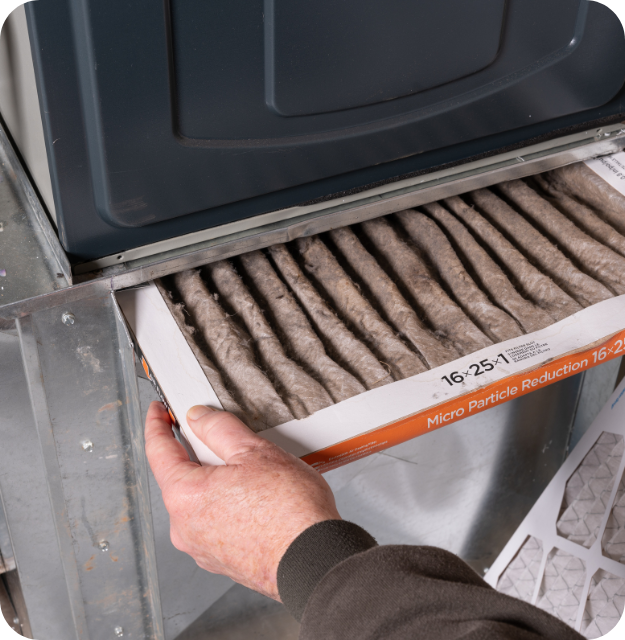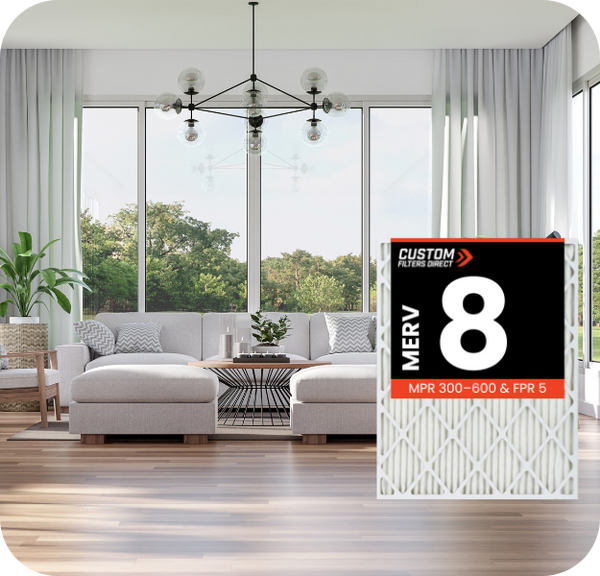Choose Your Filter Size
MERV 8 Air Filters: Precision And Effectiveness

Signs It's Time To Replace Your MERV 8 Filter
One of the most important things that you should remember is to make a schedule for regularly replacing your MERV 8 air filter. There are certain signs that you will start to get when it is time to replace your air filter.
- Filthy Filter: The very first sign that you will notice is that your air filter is getting pretty dirty. When there will be dirt, debris, and dust visible in the air filter then it is a clear indication that the air filter has exceeded its limit and should be replaced as soon as possible or it will cause restrictions in the airflow.
- Getting Higher Energy Bills: When dirt and dust cause blockage in your air filter then it puts extra workload on your HVAC system and forces it to work even harder. This leads to more consumption of energy and higher utility bills.
- Lower Performance Of HVAC System: When you start to notice that your HVAC system is not able to provide you with the same level of performance then the reason for this can be because of a clogged filter which can decrease airflow and eventually cause uneven temperature.
- Terrible Odors: If you do not replace your dirty air filter then it can become the reason for getting bad or unpleasant odors from your vents. To make sure that your air filter stays fresh you need to make sure that you replace your air filter on a regular basis.
Need Help Choosing The Right Filter?
Why Choose MERV 8 Air Filters?

Effective Filtration
This air filter is quite effective for collecting airborne particles like dust, pollen, pet hair and fur, and mold spores. Because of its effective filtration, it reduces allergens and pollutants while enhancing the overall quality of air in your space like your home or office.

Budget-Friendly Option
It provides you with amazing efficiency while being quite an affordable solution for you. MERV 8 air filters are cheaper than other MERV air filters with the same level of MERV ratings. Because they offer you enhanced air quality it makes them an ideal reason for choosing MERV 8 air filters.

Adaptable In Various Environments
One of the biggest reasons to choose MERV 8 air filters is that it operates amazingly in multiple environments. So, whether you are looking for an air filter for your residential spaces like homes, apartments, or commercial spaces. This filter will be an effective option for you.

Easy To Maintain
MERV 8 air filters do not just provide you with its peak performance but these air filters are quite easy to maintain. With regular replacement, you can be sure that your air quality will be higher and the smooth running of your HVAC systems will be ensured.

How Long Do MERV 8 Filters Last?
MERV 8 air filters are designed to provide you with better and more trustworthy filtration for a decent amount of time. On average, a MERV 8 air filter can last for about 2 to 3 months. However, their overall lifespan depends on several factors including the level of trapping airborne particles.
- Highly Polluted Areas: When you live in an area that has high levels of pollution like dust, pollen, and other kinds of pollutants then your air filter will get dirty even more quickly and will eventually require more frequent replacement.
- Standard Lifespan: Most of the MERV 8 air filters can last for 2 to 3 months. So, it is important that you regularly check your air filter as it will help determine when it will be time to replace your air filter.
- Frequent Usage Of HVAC: If you are continuously running your HVAC system because of extreme weather conditions then it will affect the lifespan of your MERV 8 air filter. More frequent usage can result in sooner replacements.

Proof Of Happy And Satisfied Customers
There’s no better proof of the quality of our custom air filters and service than these testimonials from our satisfied customers:

I use this website every time I need to order filters for my house. Service is great, & the product is great. We had a very hard time finding our odd sized filter in stores or online.



I own and operate a residential rental property business. Changing air filters has been a huge challenge for us in the past. Custom Filters Direct made the entire process for us a breeze



I never knew the importance of an air filter subscription until I actually had my filters delivered on a quarterly basis. Every time I forgot about the filters they show up in the mail!



We needed a custom size for our new rooftop units, contacted Custom Filters Direct and they got me exactly what I needed, delivered to my property managers office a few days later. Highly recommended



They arrived quickly and I noticed the difference in air quality the night I put them in! Perfect filters – especially for anyone with allergies!


-


(46) Verified Reviews
-


(46) Verified Reviews
-


(46) Verified Reviews
-


(46) Verified Reviews
-


(46) Verified Reviews
Frequently Asked Questions
Yes, MERV 8 air filters are considered good for homes with allergies as they help trap larger particles like dust and pollen. However, if a person is suffering from severe allergy problems then it is recommended that a person should choose an air filter with a higher MERV rating like the MERV 11 or MERV 12 air filter. These air filters are more efficient in capturing smaller particles like pet dander and mold spores.
MERV 8 air filters do not usually cause any restriction in the airflow of your HVAC systems. This quality makes it a good choice for many homeowners. MERV 8 air filters offer you better airflow and can also help save energy while extending the overall lifespan of your HVAC system. However, MERV 8 can still cause some restrictions in the airflow due to reasons like your HVAC system has gotten older, the blower motor is weak, or not replacing the air filter for a long time.
No, MERV 8 air filters do not require professional installation. This air filter can fit perfectly with many types of HVAC systems without needing any kind of modification. Because of this reason MERV 8 air filter is considered a popular choice as it offers your perfect balance of performance and adaptability. MERV 8 is not just an affordable option but can also be easily replaced which makes it a convenient option.
Yes, MERV 8 air filters are considered quite suitable for pet owners as they help in effectively trapping the pet dander like your pet hairs and furs. Many experts recommend having an air filter that has a MERV rating between 8 to 13 for homes with pets as it catches smaller allergens more efficiently. Choosing MERV 8 air filters will also help you maintain proper airflow in your HVAC systems.
MERV 8 air filters are quite energy efficient as they perfectly balance the trapping of particles while maintaining the airflow. One of the best qualities of MERV 8 air filters is that they do not put extra workload on your HVAC systems which eventually results in the consumption of less energy. Because of better airflow and less burden, it also helps extend the lifespan of your HVAC unit.

 Email Us
Email Us Shop Now
Shop Now




